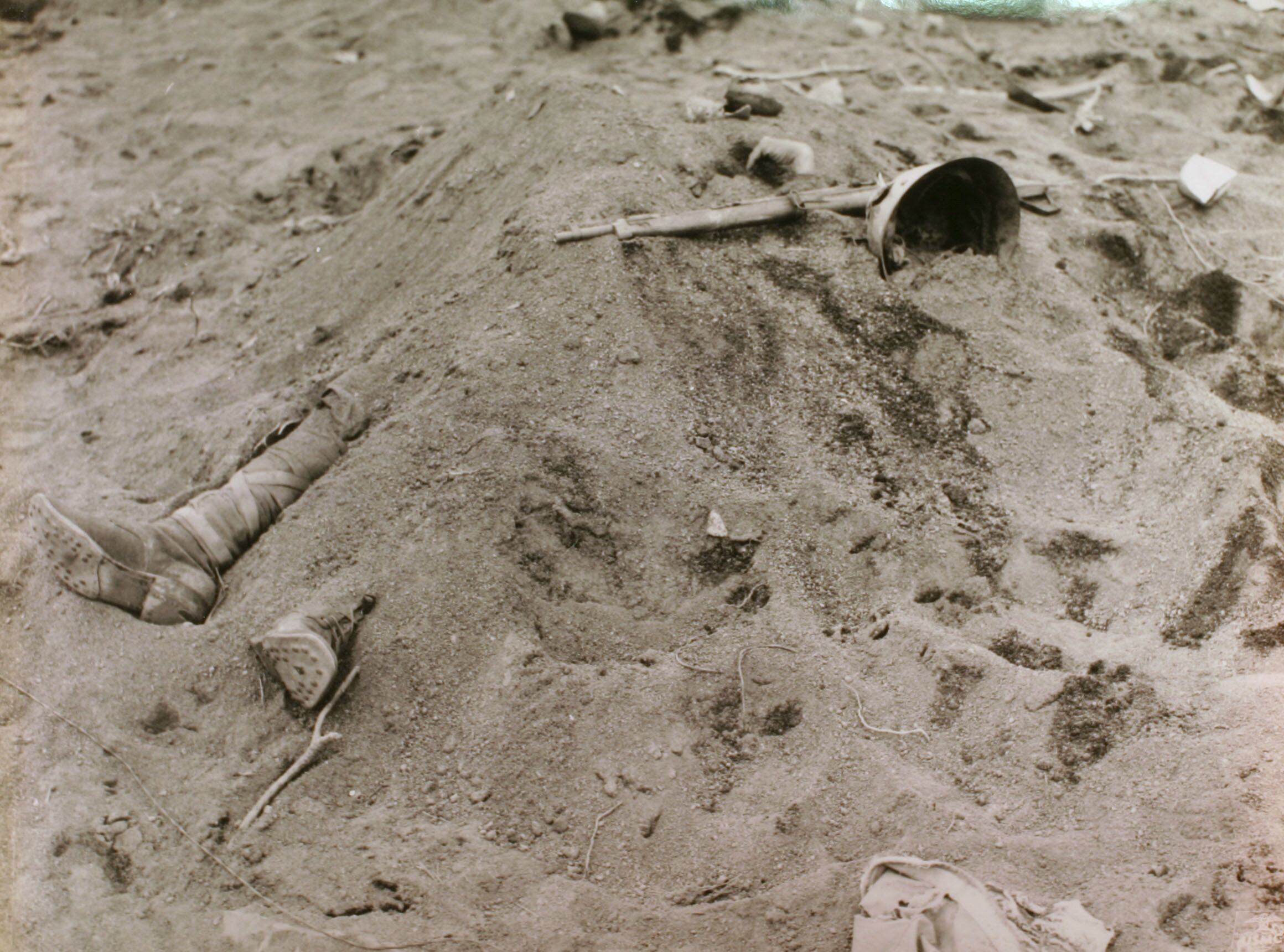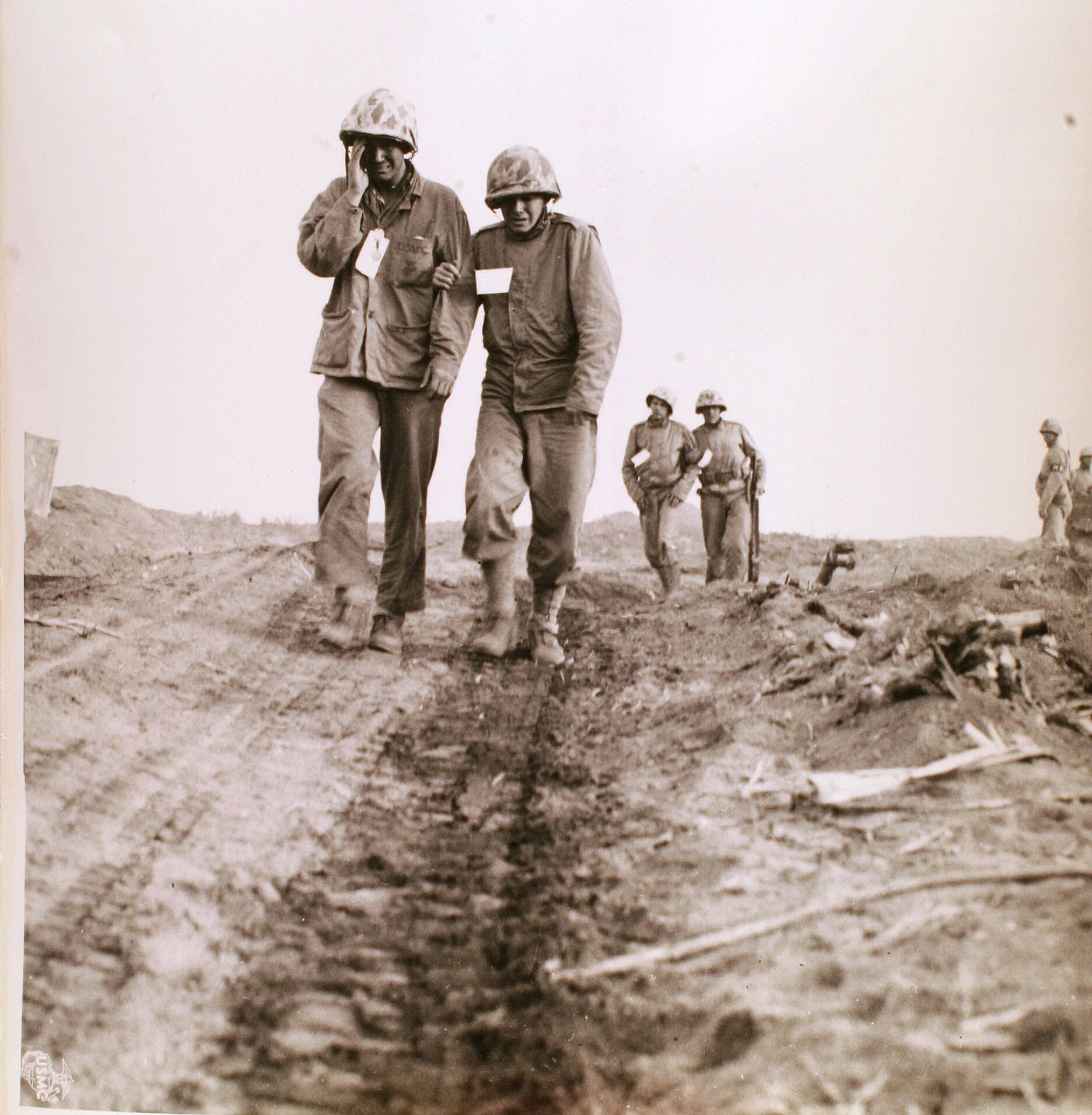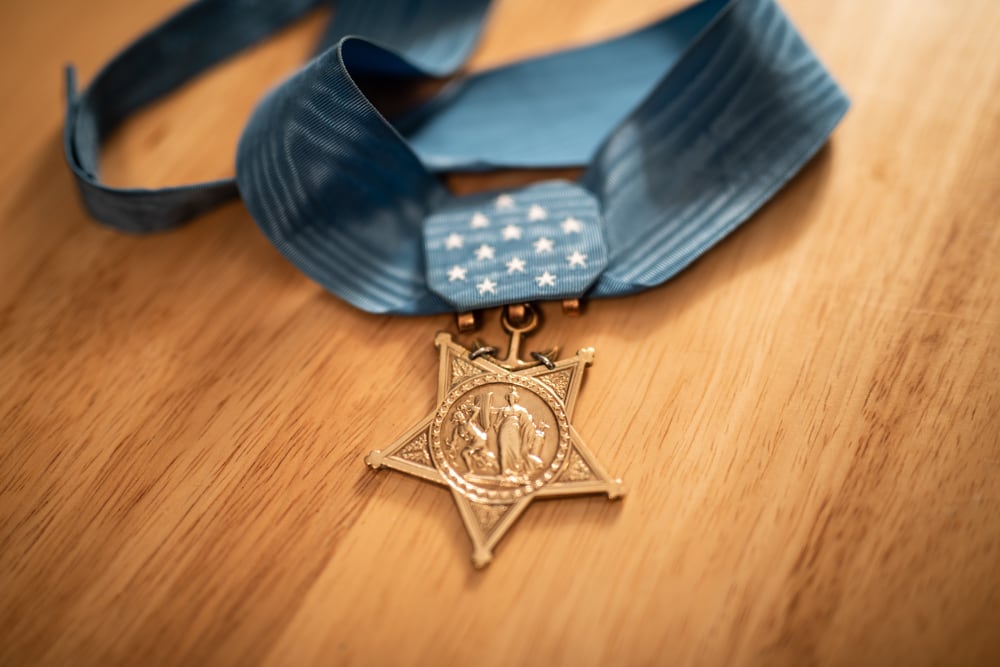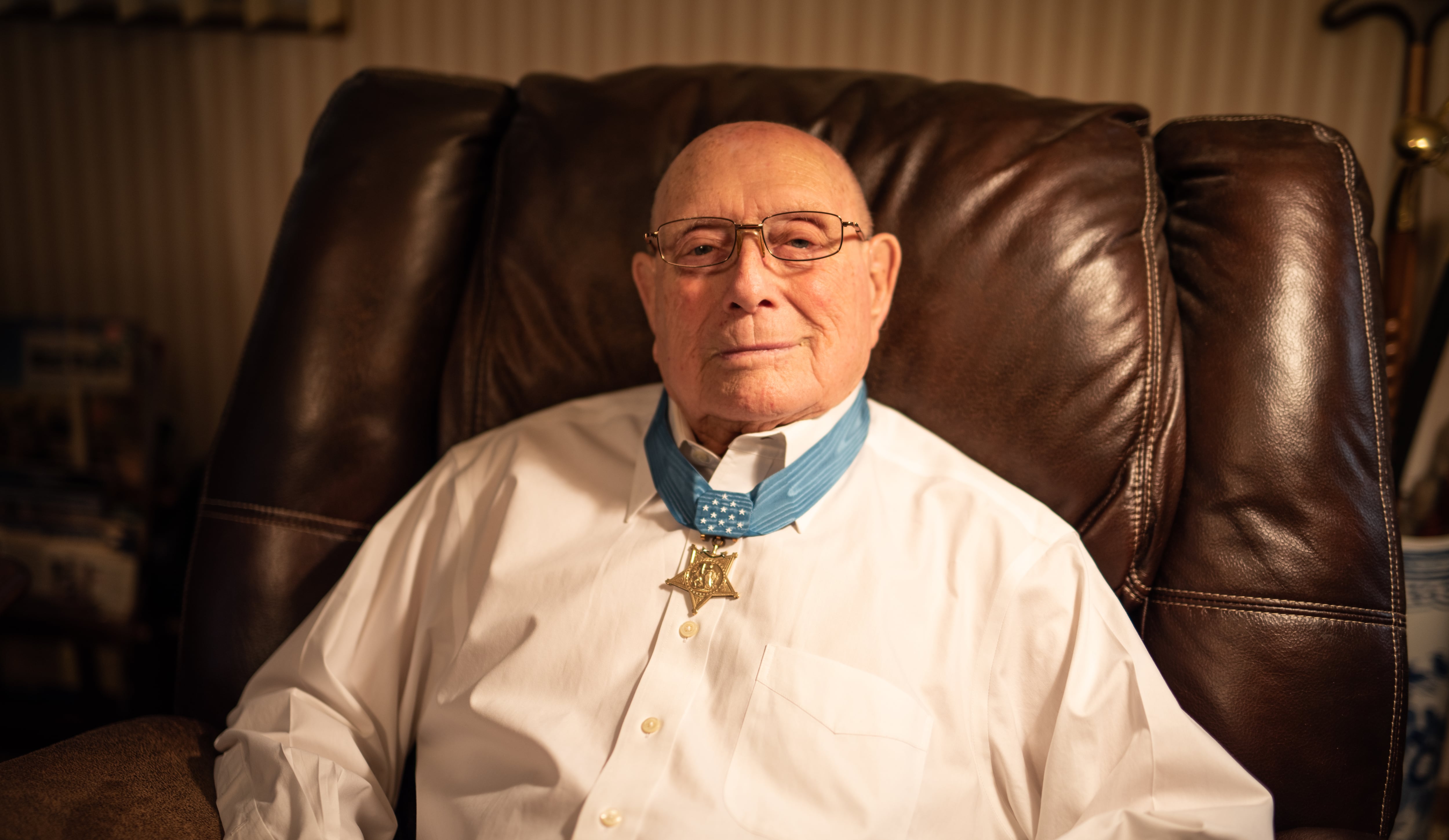Editor’s note: Feb. 19, 2025, marks the 80th anniversary of the start of the Battle of Iwo Jima. In February 2020, Military Times interviewed Iwo Jima veteran and Medal of Honor recipient Hershel “Woody” Williams. Williams died on June 29, 2022. He was 98.
Hershel “Woody” Williams’ eyes still sparkle with a country boy optimism not even memories of unimaginable horrors can dull.
Along the walls of his quaint West Virginia home hang an array of artifacts that symbolize a distinguished Marine Corps career. Plaques, commemorative coins, a Marine noncommissioned officer sword and other ornamental tokens chronicle an unforgettable story of a fabled — yet remarkably humble — existence.
At 96, the Medal of Honor recipient who grew up on a farm just miles from his current residence maintains an indefatigable lifestyle that would wear down men 50 years his junior. He travels often and will soon be embarking on a multi-city trip to promote the Hershel “Woody” Williams Medal of Honor Foundation, an organization that provides support to Gold Star families.
On this chilly afternoon in the tiny community of Ona, Williams, one of just two Medal of Honor recipients remaining from World War II, settles into his favorite brown leather recliner and adjusts his glasses before tapping into his extraordinary memory to discuss the reason for our visit — the 75th anniversary of the Battle of Iwo Jima.
His life, he says — a sly smirk washes across his face — would have taken an entirely different path had the Marine Corps simply maintained their initial height requirement. At just 5 foot 6, Williams, whose keen sense of humor is rivaled only by his exceptional recollection, was two inches shy of the Corps’ cutoff point in 1942 when he attempted to enlist.
Like many Americans at the time, Williams was spurred on to join the military following the Japanese attack at Pearl Harbor, a place, he admits, he had never heard of before Dec. 7, 1941.
“In fact, most of us didn’t even know we had a Pacific Ocean,” he laughs.
Two of Williams’ brothers were drafted into the Army in the wake of the attack. From time to time they would return to the farm on leave, and Woody would see them walking up the road wearing “that old drab, brown wool uniform that looked horrible,” he jokes.
Woody knew then that he wanted to be a Marine. “I decided I didn’t want to be caught in that thing.”
With Marine casualties mounting on a small island in the Pacific called Guadalcanal, the Corps loosened its height restrictions. Woody, with his now-permissible stature, made an immediate trip to the Marine Corps processing station, where he was greeted, in true military tradition, by a stack of paperwork and a long line.
But as he approached the receptionist, Woody realized he had left one section of the paperwork blank. At the top of the required space was the word “Religion.”
“I’d never been to church in my life. I had never heard anything about Methodists or Episcopalian, or Baptists,” he says. "As I’m standing in line there was this Italian boy in front of me and he had his paper filled out. So, I peeked! I looked at his and he had the letter 'C' in there. I thought, ‘Well, that must be what goes in here.’
“I became a Catholic right then,” he says, shifting in his chair to accommodate a bout of laughter. “I got to boot camp and I had to go to mass. Couldn’t understand anything anybody said — they were still talking in Latin back in those days!”
Boot camp eventually gave way to infantry training, during which time Williams was approached by a gunnery sergeant who informed him he had been selected to train on the flamethrower.
“There were no instructions of how you use the thing — nothing,” Williams said. “It had a manual in there that showed all the parts, how to take it apart, put it back together, and the fuel that was to be used. But how do you use it in combat? There was no indication.”
Those assigned to use flamethrowers would experiment with various types of fuel in an effort to maximize the weapon’s efficacy. First the Marines tried kerosene, which didn’t burn hot enough. Next they tested motor oil, gasoline, and diesel, each with underwhelming results.
It wasn’t until Williams’ gunnery sergeant brought back a mystery drum of 130 octane aircraft fuel, which was subsequently mixed with diesel, that the flamethrower’s performance really began to shine.
“Nobody knew where he got it or how he got it, but here he is with it,” Williams laughs. “If you fired it into the ground 15 to 20 yards in front of you, it’d roll like a big ball of fire at 3,500 degrees Fahrenheit.”
The Marines had turned it into an effective weapon, but no one knew how instrumental the shoulder-carried inferno would be in the months to come.
IWO JIMA
Williams found himself floating on a ship in the Pacific by the time the 1945 calendar turned to February.
There he remained on Feb. 19 as the first waves of Marines waded ashore through Iwo’s black sand, the ship far enough from the volcanic island that Williams was unable to hear or see any of the carnage being unleashed on the beach miles away.
“We had been told on the way from Guam to Iwo that we would probably never get off ship because of the size of the island,” Williams recalls. “Of course, we had no intelligence on how many Japanese were there. Didn’t know that they had miles and miles of tunnels dug out — none of that information was available.”
To their surprise, mounting casualties on the island meant the service of Williams’ unit would be needed after all. So, on the morning of Feb. 20, Woody, along with hundreds of other Marines, climbed into dozens of circling Higgins boats awaiting the signal to move ashore.
But the signal never came, and each Higgins boat, which carried 35 Marines packed in so tightly that the men had to take shifts standing or sitting, continued on in circles.
“We rode in those Higgins boats all day long,” he says. “The waves were running 10 to 12 feet. You were wet all day long — there wasn’t a dry spot anywhere. Everybody got sick. It was a horrible, horrible day. We had no chow, and each of us carried two canteens, but that water didn’t last very long.
“By the time we got back on the ship that night, not only were we exceedingly hungry, but we were dehydrated. I remember getting aboard at about 11 that night. I got up on the top deck and that’s where they found me the next morning. I just couldn’t move anymore.”
Williams climbed back into a Higgins boat the following morning and relived much of the previous day’s misery. This time, however, the Marines got the signal to push toward Iwo. Landing on that wretched beach would change Woody’s life forever.
“There are some memories that you would just love to eradicate from your mind and can’t,” he says. “I can remember running out of the Higgins boat and on both sides were cordwood stacks of bodies. We had no place to put our dead, so they had rolled them in their ponchos and just stacked them up — just rows of them. That memory will just never, ever go away.”

With orders to move inland, Williams had no choice but to press on.
Marines who landed on the beaches of Iwo Jima were weighted down. Each man carried two heavy bandoliers of ammunition around their necks, grenades in their pockets, two canteens on their hips, a bedroll attached to their backs, and of course, their rifles. With only one free hand, digging through Iwo Jima’s soft, black sand proved to be an excruciating ordeal.
“It’s like digging in BBs or trying to dig a hole in a hill of corn,” Williams says. “You dig but it just keeps coming back in.”
Williams’ unit eventually made it beyond the beach to the edge of the Japanese airfield. Looking out, Marines could see hundreds of bomb craters — courtesy of American shelling bombardments in the time leading up to D-Day — that provided the only protection Marines could muster while trying to cross the exposed field of fire.
Scattered men desperately ran from crater to crater — Marines were trained to select a destination before each maneuver to avoid any uncertainty in the open — clinging to the ground to avoid withering Japanese small arms fire and mortars that ripped apart anything that dared move.
“These shell craters weren’t very large, so, contrary to everything we’d ever been taught — don’t bunch up — protection is protection, so, there’d be 10 or 12 of us in this little shell crater.”
Marines were being picked off left and right. Those who managed to make it across the airfield, like Williams, were greeted by a maze of pillboxes that were covered with sand to make them harder to locate. Additional enemy fighters hid in 50 gallon barrels buried in the ground.
“They would get down in that barrel and they would just lift that lid long enough to shoot at you, and then close the lid,” Williams recalls.
Japanese pillboxes had an opening running across the front of each enclosure approximately just eight inches in height, leaving the Marines with excessively small targets. Wave after wave of Marines charged on the series of pillboxes but were stifled or cut down.
For some, terror began to set in.
“I have always said hundreds of times that there’s always fear,” Williams says. “Anybody that tells me they were not afraid when they’re being shot at — I don’t believe that. But if fear takes over, you become useless.”
In those moments of all-consuming fear, one’s ability to rationalize, react, or even move can prove insurmountable.
“I’ve heard them call for mom,” Williams remembers. “There’s something about moms that have a healing effect on us that dads don’t even have. When I was growing up, if I fell and skinned my knee, I’d go to mom. She’d kiss it and it’d get all well. It did something psychologically where it didn’t hurt as much afterwards.
“Moms are special.”
By Feb. 23, Williams’ commanding officer and two others were all that remained of the company’s officers. Most of the squad leaders had been killed. Junior Marines were taking on jobs they never dreamed of performing.

After two days of intense fighting, Williams’ commanding officer held an impromptu meeting in the cover of one of the larger bomb craters. Officers and senior enlisted were told to attend.
Williams was ordered to join. Due to the lack of senior NCOs, then-Cpl. Williams suddenly found himself elevated to acting sergeant.
“Of course, acting sergeant,” Williams jokes. “I want to get paid for my acting!”
In the crater, the commanding officer looked at Williams and asked an earnest question. Could he use a flamethrower to take out the pillboxes?
“I have no idea what I said, but after the campaign was over with somebody made the statement that I had used the words, ‘I’ll try,’” Williams recalls.
Williams was ordered to move out with a team of four Marines. Looking at his small fireteam, he didn’t recognize the faces of two of the men.
“We were so disorganized at that point,” he says. “What outfit you belonged to didn’t make a difference.”
Williams told the two unfamiliar faces to take an indirect route toward the pillbox and fire at its small opening the moment they spotted the acting sergeant approaching the enclosure.
“You know, to keep them from being able to shoot me.”
With one Marine at his side, Williams crawled into a bomb crater within view of a pillbox that had been tearing the advancing Marines to shreds. Mustering courage, Williams crawled on his stomach toward the face of the enemy bunker. Unlike Woody, his partner raised up slightly to move in a crouch.
“A bullet hit him, went through his helmet, hit the liner and went around," he says, tracing the circumference of a helmet with his hands.
“It took him right back in that hole. I heard the hit. I looked around and he’s not there. So, I crawl back in the hole with him. Of course, I thought he was gone. His eyeballs were rolling around and he’s muttering. He was still alive, so I just went on. But he survived and he took that helmet home, I guarantee it.”
Japanese small arms fire was so intense on Iwo Jima that one Marine officer once remarked, “You could’ve held up a cigarette and lit it on the stuff going by.” But Williams kept going, eventually reaching the air vent of the first pillbox and inserting the nozzle of the flame thrower.
Williams pulled the trigger and the Japanese gun fell silent.
The unassuming Marine from West Virginia repeated this process on a series of pillboxes, breaking only once to set fire to two enemy riflemen who charged at him with bayonets.
Woody would find out years later that the other two Marines tasked with helping him that day had been killed.
“It changed the whole significance of what this Medal represents,” he said. “It really does.”

COMING HOME
To no surprise, life back home would never be the same for Williams. The self-described “shy, bashful farm boy” who “was scared to even get up in front of a class in school” now had the eyes of the nation on him.
Despite the uncomfortable celebrity that came with being awarded the nation’s highest military honor by President Harry Truman — and the ensuing public speaking engagements — Woody now admits it was a blessing in disguise.
“I was forced to become public, I had no choice,” he says. “And it was probably one of the best therapies that I could have had because I couldn’t withdraw into myself. I was forced to talk about it, and eventually I could rationalize it and say, ‘That’s in the past, so leave it there.’”
As he was in the years following the war, Williams remains focused on the future. In March, he’ll travel around the globe and step foot on the same tiny island where his heroics would cement his name in the pantheon of Marine Corps legends.
You would never know by talking to the vibrant, youthful 96-year-old that he’s endured more in his life than most would in 10 lifetimes.
That’s just what a mission against tyranny necessitated, he says. He has no regrets.
Still, Williams admits, taking human lives leaves one with an indelible impression.
“I was raised in an era where the family taught you that you do not kill anything. Not even a bird. Nothing, unless there’s a purpose for it,” Williams says.
“I know there’s no way you can win a war without eliminating the other party. That’s war. But there’s still something within every human being of sound mind that says, ‘There’s only one life. You can’t restore it.’”
Pausing for a moment, Williams adds that despite the horrors of war in the Pacific, he bears no ill will toward anyone.
“[The Japanese] never did anything to me personally,” he says.
“They were trying to do something to my country, and I wasn’t gonna let them do that.”
J.D. Simkins is the executive editor of Military Times and Defense News, and a Marine Corps veteran of the Iraq War.





